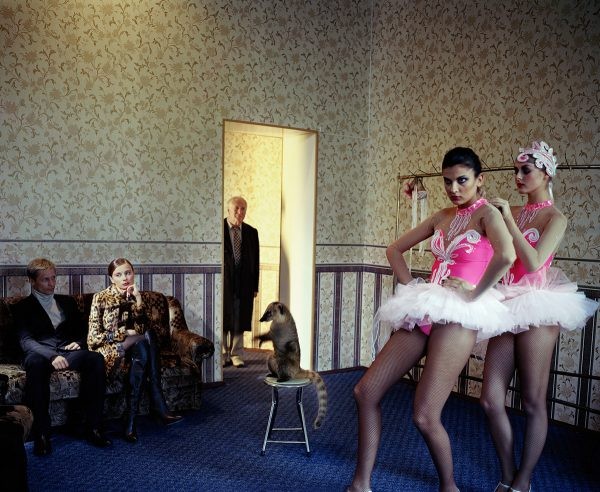Gallery exhibitions complement SFMOMA’s Larry Sultan show
by Charles Desmarais
The tight and transcendent exhibition of the life’s work of Larry Sultan at the San Francisco Museum of Modern Art had to leave some things out. But the artist’s significance and his popularity in the Bay Area led to a desire to fill out the story elsewhere.
Two exhibitions at Minnesota Street Project attempt to take up that slack.
“Fake Newsroom” extends upon “Newsroom,” a project Sultan and Mike Mandel, frequent collaborators, presented in 1983 at what is now the UC Berkeley Art Museum and Pacific Film Archive. Both an online publication and an exhibition-cum-performance, it runs through April 29.
Meanwhile, the Casemore Kirkeby gallery is presenting “Larry Sultan: Editorial Works” through June 10.
When Mandel and Sultan installed news service satellite feeds at Berkeley nearly 35 years ago, newspapers were printed on newsprint — there were no digital platforms. Alongside a limited number of television broadcasters, they were the trusted source of visual news.
For five weeks, the artists gathered and sorted reams of Associated Press and United Press International images daily, transforming them into new narratives, unmoored from their original context.
“Fake Newsroom,” a tribute to the original, is being maintained and developed by Jason Fulford, Jim Goldberg and Dru Donovan at the invitation of Mandel and the estate of Larry Sultan. I saw it in its nascency, with some office and printer equipment around the room and a team of three poring over a scatter of small photos, spread on the floor. Fulford promised more to look at in the gallery in coming days. A diverting, newspaper-format website that changes daily based upon the artists’ research is at www.fakenewsroom.org. I hardly need to mention the timeliness of the theme.
An entry gallery presents photographs of a Mandel/Sultan collaboration over many years, a series of billboards conjured from orphan images and presented without explanation throughout California between 1973 and 1989. Perhaps the best known is the surreal “Oranges on Fire,” presented full scale in original, brilliant silkscreen color, and also on view in a different version at SFMOMA.
At Casemore Kirkeby, rarely seen excerpts from commercial and editorial assignments that Sultan accepted between 1993 and 2009 are on view. The connection to his personal work is clear and informative — and the pictures are original and riveting, even when they are designed to sell something.
